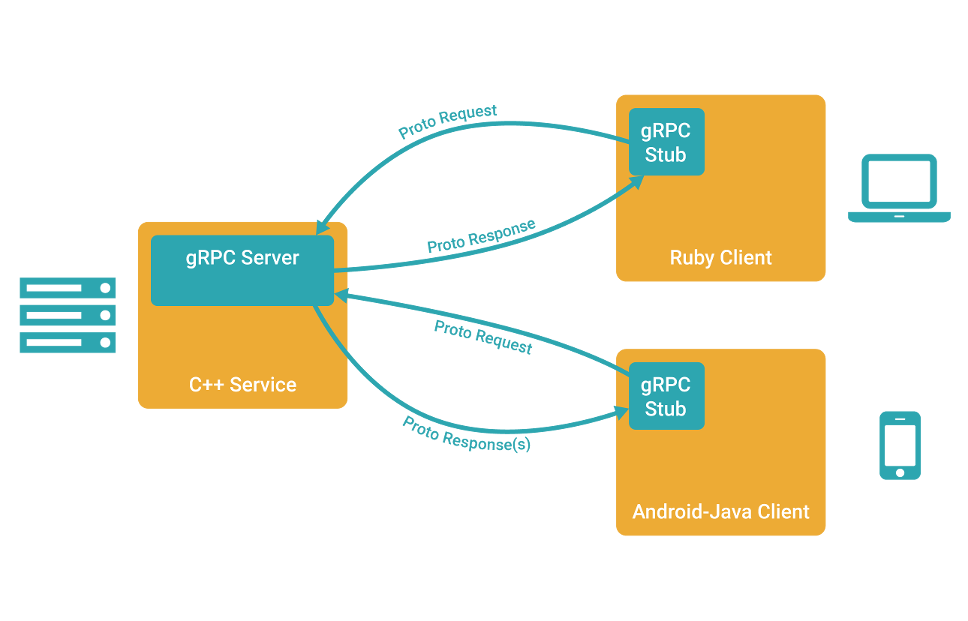gRPC exploration in golang
background
As a web api developer, when I hear “RPC” my first inclination is to run and hide behind my good friends REST and HTTP. But recently I came across a task where I couldn’t do that. We all like to stay in our comfort zone for work tasks and tend not to stray too far from what we understand, and is easy for us.
Well I found a project recently at work where “normal” web development wouldn’t work. Transferring tens of millions of customer accounts from our legacy data storage to our new micro-service architecture written in golang. Just some napkin math showed that “just writing an API” wouldn’t cut it.
introducing protobuf
Doing some thought experimentation with a peer and manager it came pretty clear that we needed a better serialization mechanism than JSON, or XML. Then Protocol Buffers came up as an option.
Protocol Buffers, as mentioned on the site, is a language-neutral, platform-neutral extensible mechanism for serializing structured data. The Protocol Buffers project is a transpiler of sorts. It has a structured language which then compiles the transport serialization code into your chosen language to be included in your project. For example you can see below where I am making a simple RPC definition with a simple input and output message:
syntax = "proto3";
package migrate;
service Migration {
rpc PutAccount (AccountRequest) returns (AccountReply) {}
}
message AccountRequest {
string request_id = 1;
string account_id = 2;
//...
}
message AccountResponse {
string request_id = 1;
bool success = 2;
//...
}Simply put, the above Migration service has a PutAccount RPC method which
takes in an AccountRequest and outputs an AccountReply. How easy was that?
After downloading the version 3 proto buffers compiler you can run:
protoc --proto_path=./ --go_out=./ ./foo.proto
Where foo.proto is the proto buffer definition from above. You will then find a file called foo.pb.go which is the “compiled” proto buffer go code. Pretty cool that you can make a service definition in a meta language and have it fully implemented.
introducing gRPC
gRPC is google’s HTTP2 wrapped RPC protocol. RPC is Remote Procedure Call. What this allows is for a client running on a computer to access a remote computer, via computer network, and call a “function” on that remote computer as if the function was local to the client. You can already see the benefits I would imagine for creating a migration client/server application using RPC.
gRPC looked interesting as a wrapper for protocol buffers as we would get a lot of things for free. These things include:
- Ability to reuse tcp connections
- ability to have authentication per transport and per call
- ability to use web technologies
- ability to take advantage of http2 in golang
Below You can see an image, taken from the grpc.io site which explains what gRPC conceptually looks like. It mainly consists of a server and clients which call functions with parameters and recieve responses.

gRPC has many benefits over straight RPC (which is also easy with protocol buffers in golang) in that you inherit nice things like TLS for free. You also inherit the ability to use client certificates for transport authentication. Moreover if you are really interested in authentication and authorization you can even use oauth2.0 to auth your RPC calls on a per call level.
Below is a quick example of our service defined above in a gRPC server:
package main
// imports and stuff ...
// this is assuming that your foo.pb.go is in the main package
type accountMigrationServer struct {}
// PutAccount - this is our "implemention" of our RPC, which takes a context as
// well as our AccountRequest as input and returns our AccountReply as output
func (s *accountMigrationServer) PutAccount(ctx context.Context, in *AccountRequest) (*AccountReply, error) {
// do stuff
return &AccountReply{
RequestId: in.RequestId,
}
}
func main() {
lis, err := net.Listen("tcp", fmt.Sprintf(":%d", *port))
if err != nil {
log.Fatalf("failed to listen: %v", err)
}
// create our grpc server below
grpcServer := grpc.NewServer()
// register our Migration Service
pb.RegisterMigrationServer(grpcServer, &accountMigrationServer{})
grpcServer.Serve(lis)
}conclusion
This seems like the way to go for migration type tasks, and I am excited to see how it goes. It turns out it is pretty nice going outside your comfort zone on occasion.